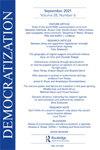2022年世界状况:面对独裁的反抗
IF 2.9
1区 社会学
Q1 POLITICAL SCIENCE
引用次数: 15
摘要
摘要本文使用最新的民主多样性数据集(V13)介绍了2022年世界的民主状况。主要有四个发现。首先,全球普通公民享有的民主水平已降至1986年的水平,世界上72%的人口生活在独裁国家。第二,第三次独裁浪潮达到了一个新的高度,有42个国家实行独裁。相比之下,只有14个国家正在实现民主化。第三,1992年至2022年间,独裁政权在全球经济中的份额有所增加,按购买力平价衡量,目前占世界GDP的46%。第四,在过去的10年里,八个国家无视全球独裁浪潮,不仅停止了独裁,而且扭转了独裁,我们将其定义为民主的180度大转弯。我们发现,在已确定的案例中,有五个要素似乎很重要:行政约束、大规模动员、权力交替、与民间社会联合的统一反对派以及国际民主支持。我们分析了这些因素的不同组合,并讨论了它们如何在阻止和扭转当代专制化方面发挥关键作用。第一次分析表明,对这八个案例及其反事实进行深入的比较案例研究将是未来研究的一个重要领域。本文章由计算机程序翻译,如有差异,请以英文原文为准。
State of the world 2022: defiance in the face of autocratization
ABSTRACT This article presents the state of democracy in the world in 2022 using the most recent Varieties of Democracy dataset (V13). There are four main findings. First, the level of democracy enjoyed by the average global citizen is down to 1986-levels and 72% of the world’s population live in autocracies. Second, the third wave of autocratization reaches a new height with 42 countries autocratizing. By contrast, only 14 countries are democratizing. Third, between 1992 and 2022, autocracies increased their share of the global economy and now account for 46% of world GDP when measured by purchasing power parity. Fourth, defying the global wave of autocratization, eight countries not only stopped but also reversed autocratization in the last 10 years, which we define as democratic U-turns. We find five elements that seem important across the identified cases: executive constraints, mass mobilization, alternation in power, unified opposition coalescing with civil society, and international democracy support. We analyze different combinations of these factors and discuss how they could be critical in stopping and reversing contemporary autocratization. This first analysis suggests that in-depth, comparative case studies of these eight cases and their counterfactuals would be an important area of future research.
求助全文
通过发布文献求助,成功后即可免费获取论文全文。
去求助
来源期刊

Democratization
POLITICAL SCIENCE-
CiteScore
6.40
自引率
12.50%
发文量
73
期刊介绍:
Democratization aims to promote a better understanding of democratization - defined as the way democratic norms, institutions and practices evolve and are disseminated both within and across national and cultural boundaries. While the focus is on democratization viewed as a process, the journal also builds on the enduring interest in democracy itself and its analysis. The emphasis is contemporary and the approach comparative, with the publication of scholarly contributions about those areas where democratization is currently attracting considerable attention world-wide.
 求助内容:
求助内容: 应助结果提醒方式:
应助结果提醒方式:


